Serving 400 students in grades Kindergarten-8, Riverdale Grade School ranks in the top 5% of all schools in Oregon for overall test scores (math proficiency is top 5%, and reading proficiency is top 5%).
The percentage of students achieving proficiency in math is 71% (which is higher than the Oregon state average of 31%). The percentage of students achieving proficiency in reading/language arts is 89% (which is higher than the Oregon state average of 44%).
The student:teacher ratio of 16:1 is lower than the Oregon state level of 17:1.
Minority enrollment is 25% of the student body (majority Hispanic), which is lower than the Oregon state average of 42% (majority Hispanic).
Quick Stats (2025)
- Grades: Kindergarten-8
- Enrollment: 400 students
- Student:Teacher Ratio: 16:1
- Minority Enrollment: 25%
- Overall Testing Rank: Top 5% in OR
- Math Proficiency: 71% (Top 5%)
- Reading Proficiency: 89% (Top 1%)
- Science Proficiency: 75-79% (Top 1%)
- Source: National Center for Education Statistics (NCES), OR Dept. of Education
Top Rankings
Riverdale Grade School ranks among the top 20% of public schools in Oregon for:
Category
Attribute
Overall Rank
Math Proficiency
Reading/Language Arts Proficiency
Science Proficiency
School Overview
Riverdale Grade School's student population of 400 students has stayed relatively flat over five school years.
The teacher population of 25 teachers has grown by 13% over five school years.
Grades Offered
Grades Kindergarten-8
Total Students
400 students
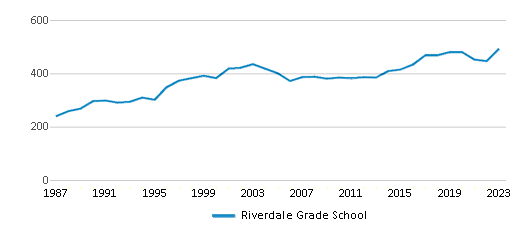
Gender %
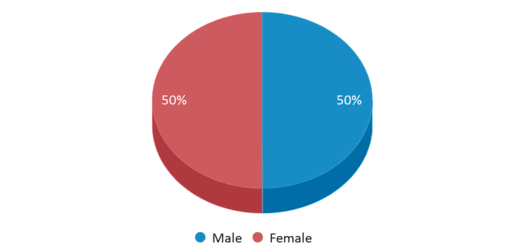
Total Classroom Teachers
25 teachers
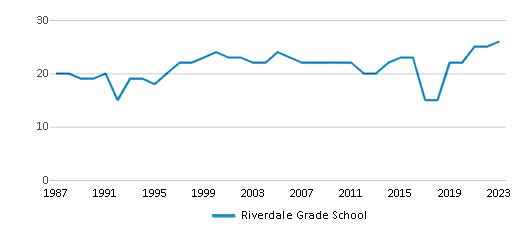
Students by Grade
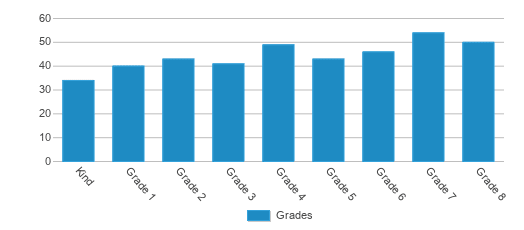
School Rankings
Riverdale Grade School ranks within the top 5% of all 1,196 schools in Oregon (based off of combined math and reading proficiency testing data).
The diversity score of Riverdale Grade School is 0.42, which is less than the diversity score at state average of 0.60. The school's diversity has stayed relatively flat over five school years.
Overall Testing Rank
#13 out of 1196 schools
(Top 5%)
(Top 5%)
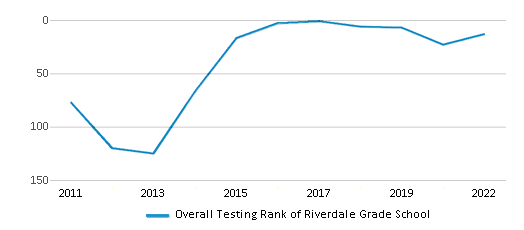
Math Test Scores (% Proficient)
71%
31%
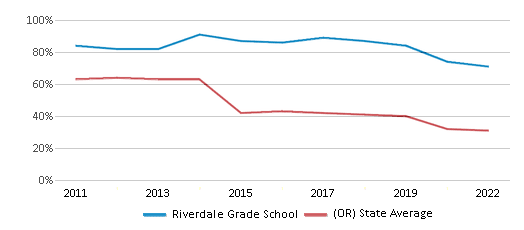
Reading/Language Arts Test Scores (% Proficient)
89%
44%
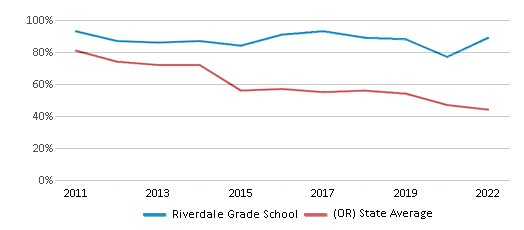
Science Test Scores (% Proficient)
75-79%
30%
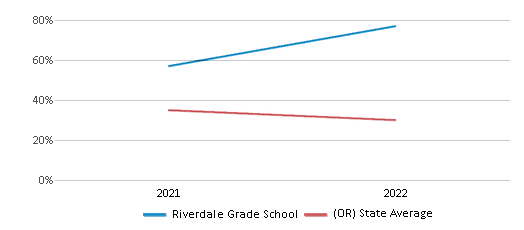
Student : Teacher Ratio
16:1
17:1
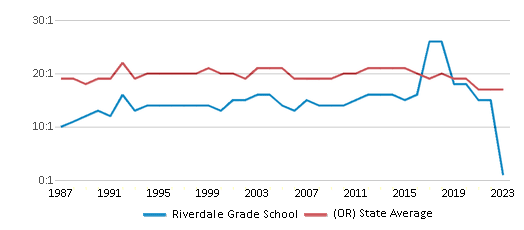
American Indian
n/a
1%
Asian
4%
4%
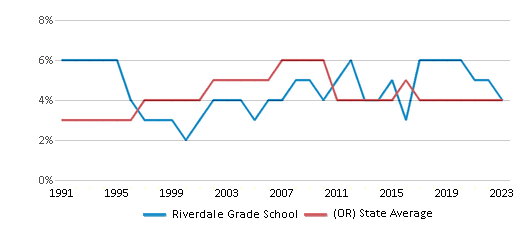
Hispanic
7%
26%
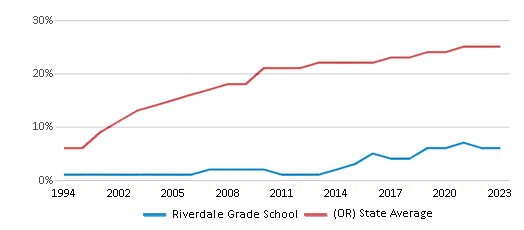
Black
1%
3%
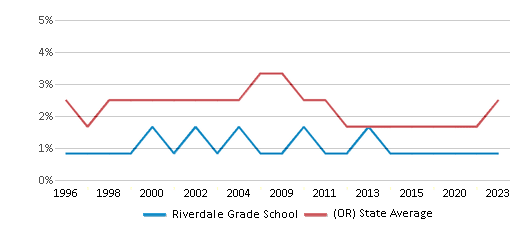
White
75%
58%
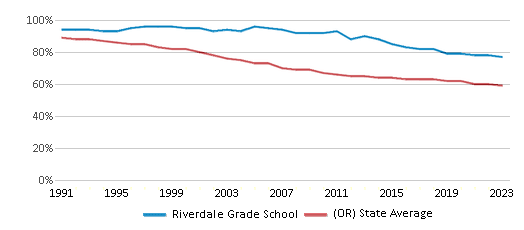
Hawaiian
n/a
1%
Two or more races
13%
7%
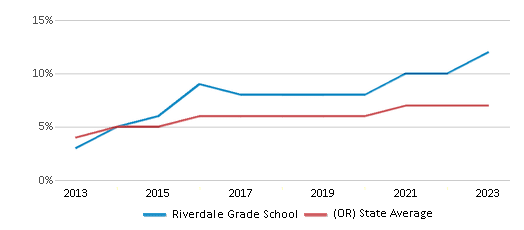
All Ethnic Groups
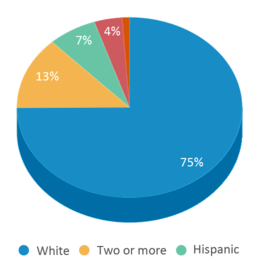
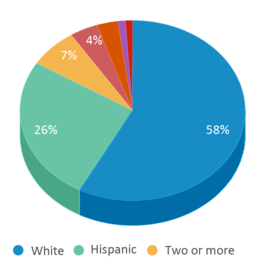
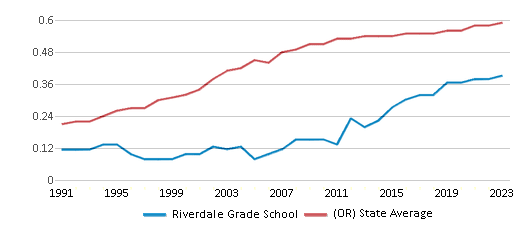
Eligible for Free Lunch
1%
51%
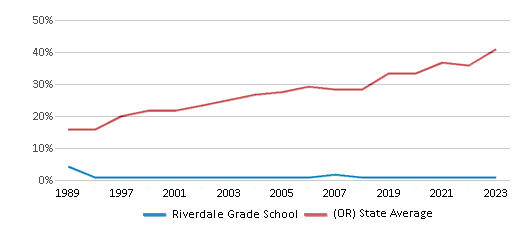
Eligible for Reduced Lunch
1%
3%
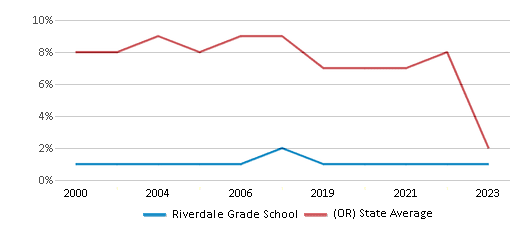
School Statewide Testing
School District Name
Source: National Center for Education Statistics (NCES), OR Dept. of Education
Profile last updated: 02/09/2025
Frequently Asked Questions
What is Riverdale Grade School's ranking?
Riverdale Grade School is ranked #13 out of 1,196 schools, which ranks it among the top 5% of public schools in Oregon.
What schools are Riverdale Grade School often compared to?
Riverdale Grade Schoolis often viewed alongside schools like Winterhaven School, Sellwood Middle School by visitors of our site.
What percent of students have achieved state testing proficiency in math and reading?
71% of students have achieved math proficiency (compared to the 31% OR state average), while 89% of students have achieved reading proficiency (compared to the 44% OR state average).
How many students attend Riverdale Grade School?
400 students attend Riverdale Grade School.
What is the racial composition of the student body?
75% of Riverdale Grade School students are White, 13% of students are Two or more races, 7% of students are Hispanic, 4% of students are Asian, and 1% of students are Black.
What is the student:teacher ratio of Riverdale Grade School?
Riverdale Grade School has a student ration of 16:1, which is lower than the Oregon state average of 17:1.
What grades does Riverdale Grade School offer ?
Riverdale Grade School offers enrollment in grades Kindergarten-8
What school district is Riverdale Grade School part of?
Riverdale Grade School is part of Riverdale SD 51j School District.
In what neighborhood is Riverdale Grade School located?
Riverdale Grade School is located in the Forest Highlands neighborhood of Portland, OR.
School Reviews
4 10/6/2021
I attended Riverdale between 1955 and 1961. It was socially and academically challenging. There were troubles fitting in. There was lots of homework. But ultimately, all these things resolved, and the start I got served me well academically from high school through law school. Ultimately, Riverdale's challenges were worth the trouble.
4 4/14/2020
I have been at this school for my whole school years; this school defines my childhood. I loved all the teachers and the material that they have taught me.I would recommend this to anyone who wants their kids to enjoy just being a kid. I have had some rough times but I know I could always talk to a teacher there, and you will find trouble anyway, it's just a part of growing up. I highly recommend this school ;)
1 2/10/2020
I spent a year and a half at this school before I dropped out because it was such a horrible environment. I was bullied constantly because I was an actual person who cared about the world and other people. A kid who was a friend pushed me in the mud and then blamed it on me. Despite security footage, I was the one blamed because that kid's family made a very generous donation to the school. I was told that I would have to apologize or I would have a permanent black mark on my record. My other friends took the bully's side and shunned me. I had always gotten good grades, was an exemplary student, and it didn't matter because I couldn't bribe off the school. It has been over a year since I left and I am still working through trauma and the fear that I will never belong anywhere. For any parents considering sending their kids there, Don't. If you care at all about your children's mental and physical wellbeing, DO NOT have your kids go here.
Review Riverdale Grade School. Reviews should be a few sentences in length. Please include any comments on:
- Quality of academic programs, teachers, and facilities
- Availability of music, art, sports and other extracurricular activities
Recent Articles

What Is A Charter School?
Explore the world of charter schools in this comprehensive guide. Learn about their history, how they operate, and the pros and cons of this educational innovation. Discover key facts about charter schools, including admission policies, demographics, and funding, as well as what to look for when considering a charter school for your child.

10 Reasons Why High School Sports Benefit Students
Discover the 10 compelling reasons why high school sports are beneficial for students. This comprehensive article explores how athletics enhance academic performance, foster personal growth, and develop crucial life skills. From improved fitness and time management to leadership development and community representation, learn why participating in high school sports can be a game-changer for students' overall success and well-being.

February 05, 2025
Understanding the U.S. Department of Education: Structure, Impact, and EvolutionWe explore how the Department of Education shapes American education, from its cabinet-level leadership to its impact on millions of students, written for general audiences seeking clarity on this vital institution.









